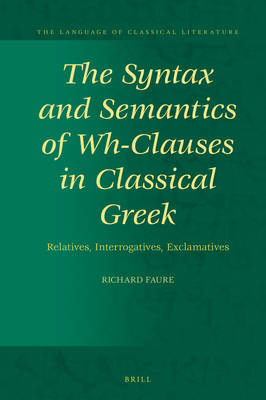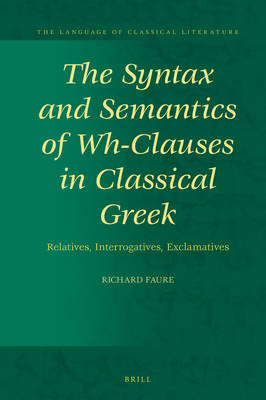
- Afhalen na 1 uur in een winkel met voorraad
- Gratis thuislevering in België vanaf € 30
- Ruim aanbod met 7 miljoen producten
- Afhalen na 1 uur in een winkel met voorraad
- Gratis thuislevering in België vanaf € 30
- Ruim aanbod met 7 miljoen producten
Zoeken
The Syntax and Semantics of Wh-Clauses in Classical Greek
Relatives, Interrogatives, Exclamatives
Richard Faure
€ 193,95
+ 387 punten
Omschrijving
Adapting tools recently developed in general linguistics and dwelling on a solid corpus study, this book offers the first comprehensive view on Classical Greek wh-clauses since Monteil (1963) and scrutinizes how wh-items (ὅς, ὅστις, τίς) distribute across the different clause types. False ideas are discarded (e.g., there are no τίς relative clauses, ὅστις does not take over ὅς' functions). This essay furthermore teases apart actual neutralization and so-far-unknown subtle distinctions. Who knew that ὅστις is featured in three different types of appositive clauses? In the interrogative domain, an analysis is given of what licenses ὅς to pop in and τίς to pop out. Tackling these topics and more, this essay draws a coherent picture of the wh-clause system, whose basis is the notion of (non)identification.
Specificaties
Betrokkenen
- Auteur(s):
- Uitgeverij:
Inhoud
- Aantal bladzijden:
- 292
- Taal:
- Engels
- Reeks:
- Reeksnummer:
- nr. 34
Eigenschappen
- Productcode (EAN):
- 9789004467521
- Verschijningsdatum:
- 23/09/2021
- Uitvoering:
- Hardcover
- Formaat:
- Genaaid
- Afmetingen:
- 155 mm x 235 mm
- Gewicht:
- 612 g

Alleen bij Standaard Boekhandel
+ 387 punten op je klantenkaart van Standaard Boekhandel
Beoordelingen
We publiceren alleen reviews die voldoen aan de voorwaarden voor reviews. Bekijk onze voorwaarden voor reviews.












